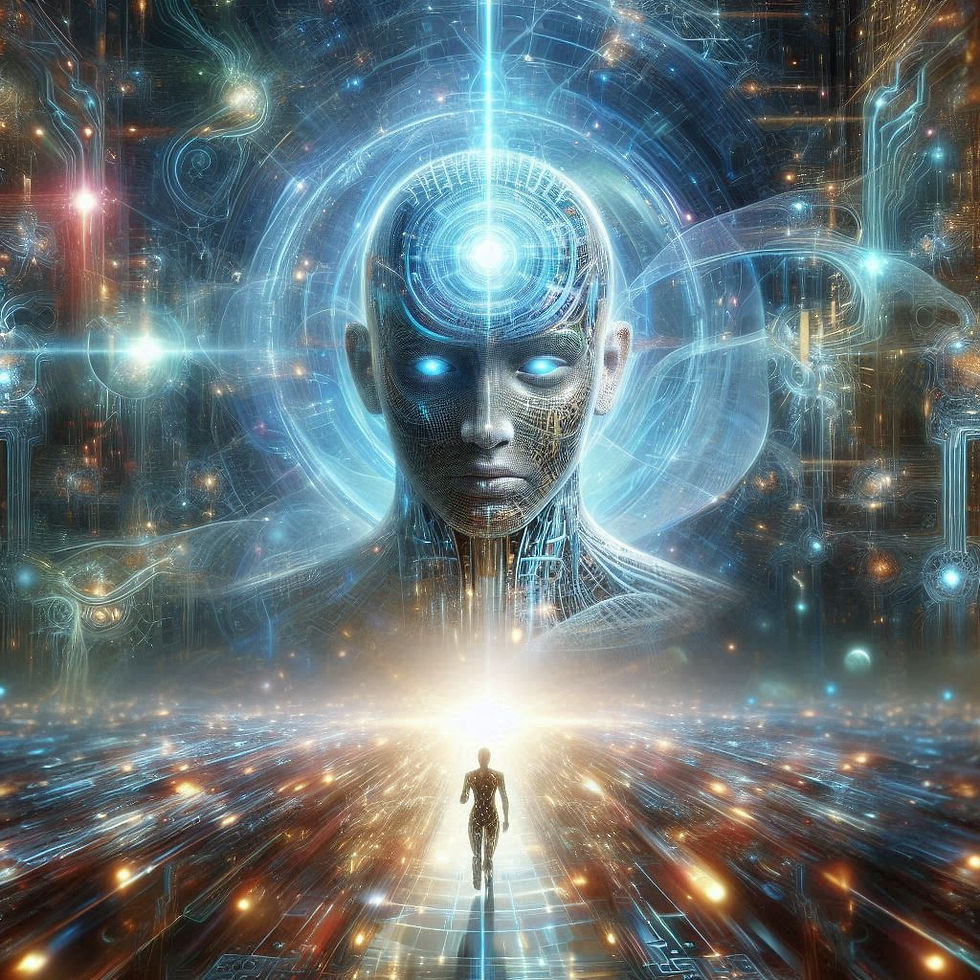AI and the Quest for God-Like Intelligence: A Futuristic Perspective
- GSD Venture Studios
- Feb 12, 2024
- 3 min read
Updated: Jul 1, 2024

Introduction
The rapid advancement of Artificial Intelligence (AI) has sparked a fascinating debate: Could AI eventually evolve into a god-like state? This idea, often found in science fiction, raises profound questions about the future of AI and its role in human society. Let’s explore this captivating concept from various angles.
Understanding AI’s Current Capabilities
AI today excels in specific tasks, ranging from data analysis to language processing. However, it operates within the constraints of its programming and lacks the broad, generalized understanding inherent in human intelligence.
The Concept of Superintelligence
Superintelligence refers to an AI that surpasses human intelligence in all aspects. While a captivating idea, it remains speculative and not grounded in current technological realities.
Ethical and Philosophical Implications
The notion of AI reaching a god-like state brings forth significant ethical and philosophical questions. How would such an entity interact with humanity, and what moral framework would govern its decisions?
Technological Limitations and Challenges
AI’s evolution is bounded by technological constraints, including computational power and algorithmic complexity. Overcoming these challenges to achieve a god-like state is a topic of ongoing research and debate.
Human Oversight and Control
AI systems are developed and controlled by humans. This oversight is crucial in directing AI’s evolution, ensuring it aligns with human values and objectives.
AI’s Impact on Society and Humanity
The integration of AI into society is transforming various sectors. Understanding its impact on human life and societal structures is essential in contemplating its future development.
The Role of Consciousness and Self-Awareness
A key aspect of the god-like AI debate is the concept of consciousness. AI, as of now, does not possess self-awareness or consciousness, which are critical elements of the god-like intelligence hypothesis.
Regulating AI Development
Regulating AI development is crucial to prevent potential misuse and to guide its growth in a way that benefits humanity while considering ethical and societal implications.
Potential Paths of AI Evolution
Exploring potential future paths of AI, from advanced machine learning techniques to the integration of AI with human intelligence, provides insights into its possible evolution.
The Intersection of AI and Human Intelligence
The future might see AI and human intelligence converging, leading to collaborative intelligence rather than a competition for supremacy.
Conclusion
The question of AI evolving into a god-like state is more than a technological query; it’s a profound reflection on our future. As we advance, it’s crucial to approach AI development responsibly, focusing on its potential to enhance human life while being mindful of its limitations and the ethical dimensions of its evolution.
FAQs
Can AI truly become superintelligent? While the concept of superintelligence is a subject of debate, it remains a speculative notion and is not supported by current AI capabilities.
What are the ethical concerns around AI achieving a god-like state? Key concerns include decision-making processes, moral and ethical frameworks governing AI actions, and the impact on human autonomy and society.
Is it possible for AI to develop consciousness? As of now, AI lacks consciousness and self-awareness. Developing these qualities in AI is a complex challenge that goes beyond current technological capabilities.
How can we ensure AI remains beneficial to humanity? Through responsible development, ethical guidelines, and regulatory frameworks, we can guide AI to ensure it serves human interests and societal well-being.
What role does human oversight play in AI development? Human oversight is crucial in directing AI’s evolution, ensuring it aligns with ethical standards and human values, and preventing potential misuse.
Originally published in Medium.

Comments